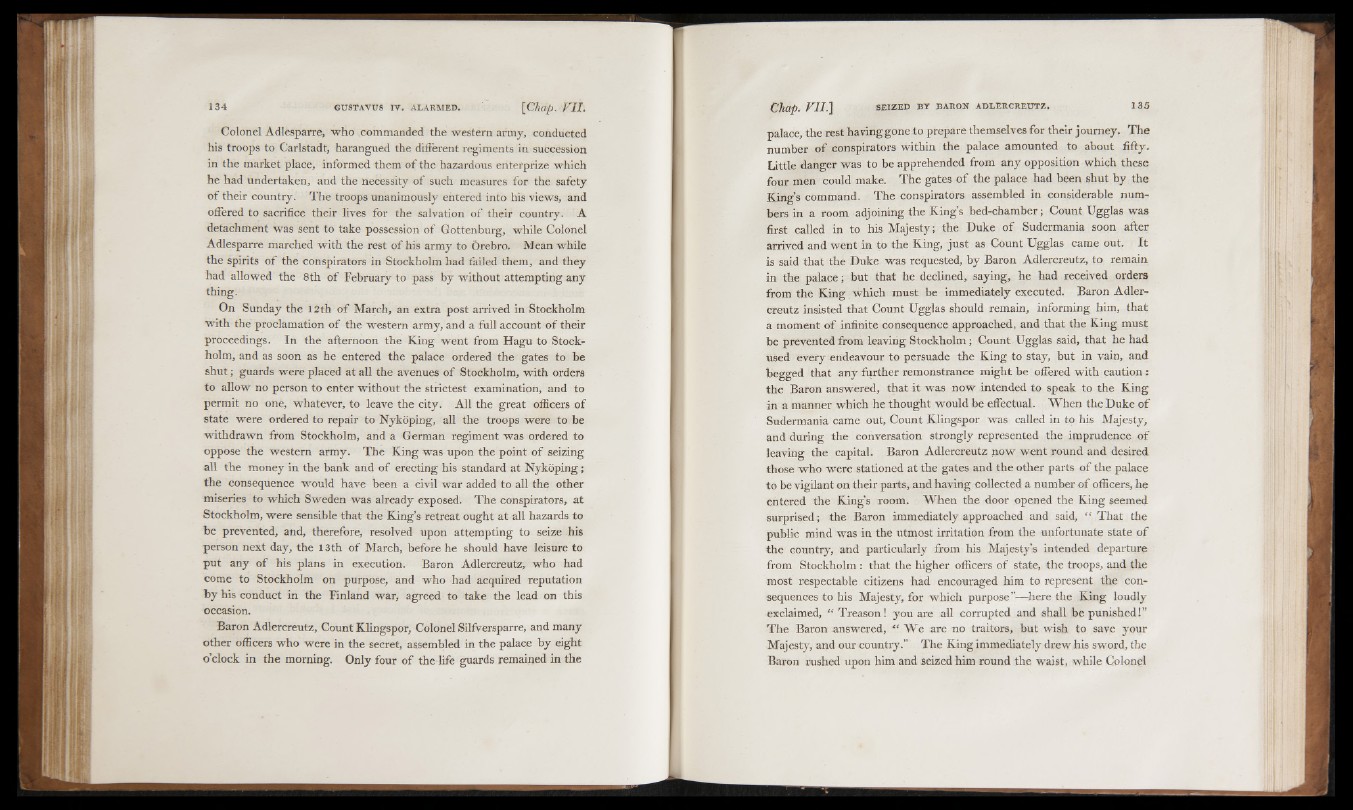
Colonel Adlesparre, who commanded the western army, conducted
his troops to Carlstadt, harangued the different regiments in succession
in the market place, informed them of the hazardous enterprize which
he had undertaken, and the necessity of such measures for the safety
of their country. The troops unanimously entered into his views, and
offered to sacrifice their lives for the salvation of their country. A
detachment was sent to take possession of Gottenburg, while Colonel
Adlesparre marched with the rest of his army to Örebro. M ean while
the spirits o f the conspirators in Stockholm had failed them, and they
had allowed the 8th o f February to pass by without attempting any
thing.
On Sunday the 12th o f March, an extra post arrived in Stockholm
with the proclamation of the western army, and a full account of their
proceedings. In the afternoon the King went from Hagu to Stockholm,
and as soon as he entered the palace ordered the gates to be
shut; guards were placed at all the avenues o f Stockholm, with orders
to allow no person to enter without the strictest examination, and to
permit no one, whatever, to leave the city. All the great officers o f
state were ordered to repair to Nykoping, all the troops were to be
withdrawn from Stockholm, and a German regiment was ordered to
oppose the western army. The King was upon the point of seizing
all the money in the bank and of erecting his standard at Nykoping;
the consequence would have been a civil war added to all the other
miseries to which Sweden was already exposed. The conspirators, at
Stockholm, were sensible that the King’s retreat ought at all hazards to
be prevented, and, therefore, resolved upon attempting to seize his
person next day, the 13 th o f March, before he should have leisure to
put any o f his plans in execution. Baron Adlercreutz, who had
come to Stockholm on purpose, and who had acquired reputation
by his conduct in the Finland war, agreed to take the lead on this
occasion.
Baron Adlercreutz, Count Klingspor, Colonel Silfversparre, and many
other officers who were in the secret, assembled in the palace by eight
o’clock in the morning. Only four o f the life guards remained in the
palace, the rest having gone to prepare themselves for their journey. The
number o f conspirators within the palace amounted to about fifty.
Little danger was to be apprehended from any opposition which these
four men could make. The gates o f the palace had been shut by the
King’s command. The conspirators assembled in considerable numbers
in a room adjoining the King’s bed-chamber; Count Ugglas was
first called in to his Majesty; the Duke of Sudermania soon after
arrived and went in to the King, just as Count Ugglas came out. It
is said that the Duke was requested, by Baron Adlercreutz, to remain
in the palace; but that he declined, saying, he had received orders
from the King which must be immediately executed. Baron Adlercreutz
insisted that Count Ugglas should remain, informing him, that
a moment of infinite consequence approached, and that the King must
be prevented from leaving Stockholm; Count Ugglas said, that he had
used every endeavour to persuade the King to stay, but in vain, and
begged that any further remonstrance might be offered with caution:
the Baron answered, that it was now intended to speak to the King
in a manner which he thought would be effectual. When the Duke of
Sudermania came out, Count Klingspor was called in to his Majesty,
and during the conversation strongly represented the imprudence o f
leaving the capital. Baron Adlercreutz now went round and desired
those who were stationed at the gates and the other parts o f the palace
to be vigilant on their parts, and having collected a number of officers, he
entered the King’s room. When the door opened the King seemed
surprised; the Baron immediately approached and said, “ That the
public mind was in the utmost irritation from the unfortunate state o f
the country, and particularly from his Majesty’s intended departure
from Stockholm : that the higher officers of state, the troops, and the
most respectable citizens had encouraged him to represent the consequences
to his Majesty, for which purpose”— here the King loudly
exclaimed, “ Treason! you are all corrupted and shall be punished!”
The Baron answered, “ W e are no traitors, but wish to save your
Majesty, and our country.” The King immediately drew his sword, the
Baron rushed upon him and seized him round the waist, while Colonel